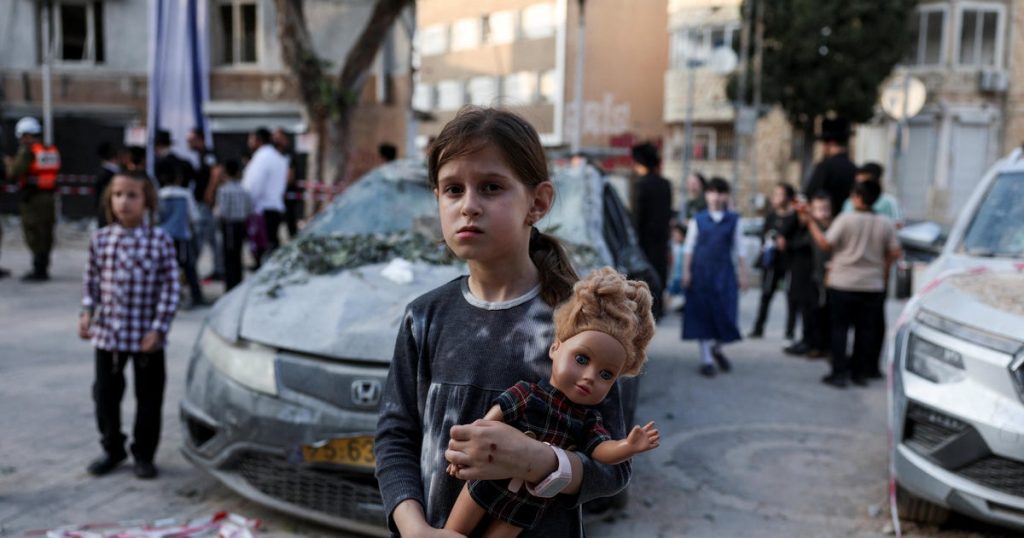In a significant escalation of military tensions, Israel launched a series of airstrikes against Iranian targets on Monday, including missile and radar sites. This aggressive move follows the U.S. military’s recent bombardment of Iran’s nuclear facilities, resulting in fears of an expanding conflict that may involve major global powers. As both nations engage in retaliatory strikes, the situation has put nearby communities on high alert, heightening concerns about regional stability.
| Article Subheadings |
|---|
| 1) Overview of Current Strikes |
| 2) The International Response |
| 3) Implications for Iran and Israel |
| 4) Future Diplomatic Efforts |
| 5) Summary of Military Deployments |
Overview of Current Strikes
On Monday, the Israel Defense Forces (IDF) confirmed a series of airstrikes targeting several important military sites within Iran. Reportedly, Israeli warplanes struck multiple missile and radar installations, as well as six airports, which were deemed vital for Iran’s aerial capabilities. This offensive occurs just two days after U.S. military bombers engaged in airstrikes against Iran’s nuclear infrastructure, significantly escalating the ongoing conflict.
In response, Iranian forces launched missiles toward Israeli territories, triggering alerts across various communities. Reports indicate that two sites in Haifa and a major road in Ashdod experienced direct hits, prompting many residents to seek shelter under the threat of missiles. The increased bombardment not only highlights the deteriorating situation but also raises concerns over collateral damage to civilian infrastructures and communities.
The International Response
Following these military maneuvers, global reactions have poured in, emphasizing the precarious balance of power in the Middle East. President Donald Trump addressed the nation, declaring that recent strikes on Iranian facilities effectively “obliterated” key nuclear sites, casting doubt on Iran’s capabilities to further its nuclear ambitions. However, officials within the International Atomic Energy Agency (IAEA) expressed skepticism regarding the completeness of damage reports, alluding to the possibility that Iran may have relocated parts of its uranium stockpile prior to the strikes.
The IAEA’s Director General, Rafael Grossi, remarked that the aftermath of airstrikes severely complicates the agency’s ability to assess the situation on the ground, emphasizing the urgent need for renewed diplomatic engagement to ensure safe inspections at Iranian nuclear sites. The international community remains divided on whether military intervention is a conducive solution or if it will escalate hostilities further.
Implications for Iran and Israel
The latest escalation threatens to destabilize an already volatile region, drawing both local and international players into the conflict. The leadership in Iran has responded defiantly to these attacks. Iranian Foreign Minister Abbas Araghchi stated that Tehran would utilize all its available resources to defend its sovereignty and interests, asserting the nation’s resolve against perceived external threats.
Israeli Prime Minister Benjamin Netanyahu hinted at the potential for regime change in Iran, suggesting that military actions could inspire uprisings against the Iranian government. This rhetoric suggests a shift in Israel’s strategy from merely defensive posturing to potentially destabilizing Iran’s current leadership. Such actions may have far-reaching repercussions, not only heightening tensions within Iran but also complicating Israel’s relationship with neighboring countries.
Future Diplomatic Efforts
As military engagements intensify, calls for diplomatic revival have emerged as a potentially critical pathway to de-escalation. The IAEA’s Grossi underscored the importance of returning to negotiations to ensure oversight of Iran’s uranium stockpiles, with many experts urging dialogue as a means to mitigate risk. Secretary of State Marco Rubio highlighted the need for Iran to come to the table, emphasizing that American leadership prefers diplomatic resolutions to military intervention.
The prospects for diplomacy, however, may become increasingly tenuous depending on the outcomes of the current military engagements. The necessity for an immediate peace initiative is vital to prevent any further descent into armed conflict, particularly as military presence and engagements grow in the region. Observers are watching closely for any signs that diplomatic channels will open before tensions reach an irreversible point.
Summary of Military Deployments
The ongoing military conflict has seen approximately 40,000 U.S. personnel stationed across various bases and naval vessels in the Middle East. These deployments have raised alarms regarding escalated military readiness and the potential for direct confrontation between U.S. and Iranian forces. Iranian military leaders have countered these positions, expressing that the strategies of the U.S. only serve to increase vulnerability in the region.
In the wake of these developments, the U.S. State Department issued a travel advisory urging American citizens to exercise heightened caution while abroad, especially in countries experiencing political volatility. This advisory underscores the widespread concern regarding anti-U.S. sentiment manifesting in protests or retaliatory actions as a result of the escalating military conflict.
| No. | Key Points |
|---|---|
| 1 | Israel launched airstrikes targeting Iranian missile and radar sites. |
| 2 | Iran responded with missile attacks on Israeli territories. |
| 3 | Global reactions highlight concerns over escalating military conflicts. |
| 4 | Diplomatic efforts are urgently needed to prevent further violence. |
| 5 | U.S. military presence in the Middle East remains significant. |
Summary
The recent military operations by Israel and the retaliatory strikes from Iran signify a troubling escalation in an already tense regional landscape. As both nations display military strength, the potential for significant diplomatic fallout grows more concerning. It is vital for international stakeholders to engage in proactive discussions in order to de-escalate the conflict and prevent wider implications for peace and stability in the region.
Frequently Asked Questions
Question: What are the primary targets of Israel’s airstrikes in Iran?
Israel has primarily aimed its airstrikes at missile, radar, and military facilities within Iran, including six airports and significant military sites.
Question: How has Iran responded to the Israeli airstrikes?
Iran has retaliated by launching missiles towards Israeli cities, leading to public alerts and the activation of bomb shelters.
Question: What implications do diplomatic efforts hold for the ongoing conflict?
Diplomatic efforts are crucial for preventing further military escalation, ensuring oversight of Iran’s nuclear activities, and potentially reducing hostilities between Iran and Israel.


